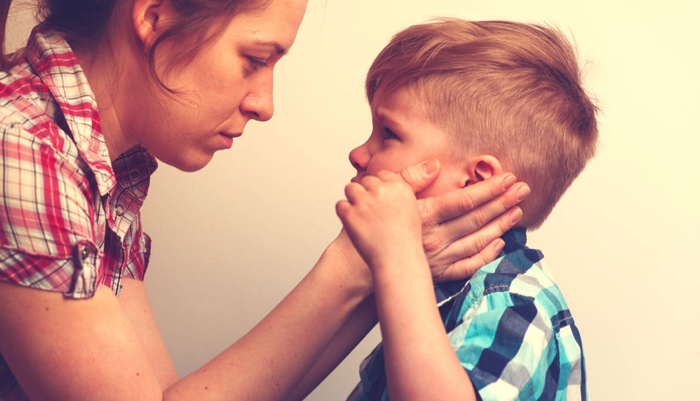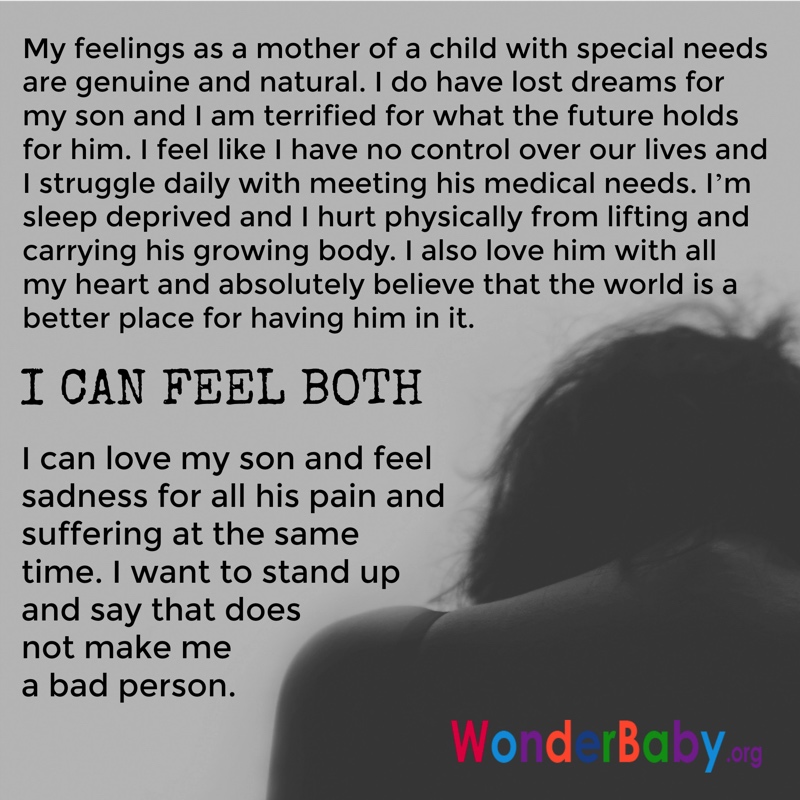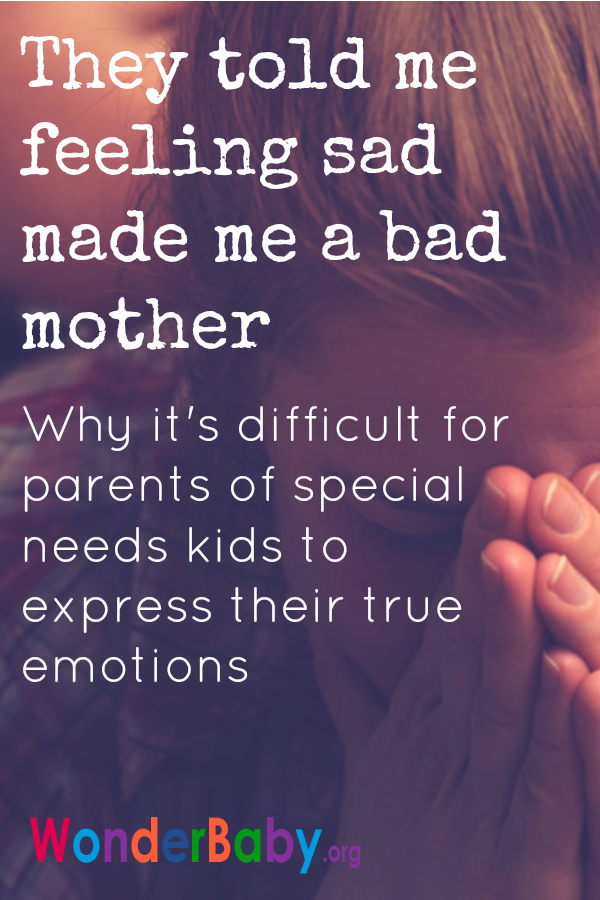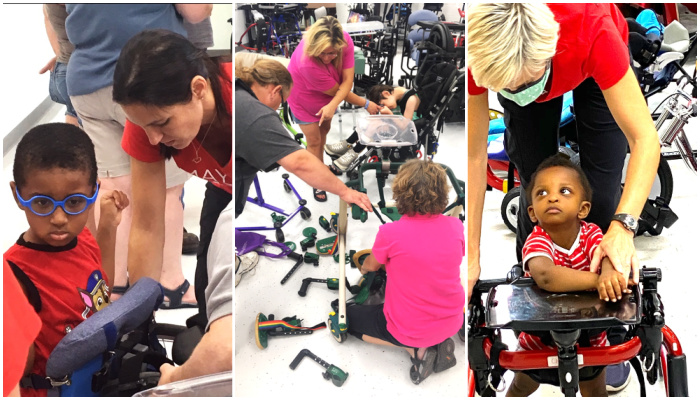They told me feeling sad made me a bad mother

I will begin with a brief explanation: I am the mother of a medically complex child with severe life-long disabilities. He will always need 24 hour care and will never be independent.
Which leads to my main point: I’m sad. I cry daily and I worry about his life, his care, his education, his future. To be honest, mostly I worry about his future without me to care for him.
But besides all the normal things I think about and worry about every day, lately I’ve also been thinking a lot about how hard it is to be a mother who is sad. And that I can’t even just say, “I’m sad.” First I have to explain, give background information and let people know what the context is to my feelings. If you want I could bring out medical documentation to confirm the reasons for my sadness. But either way, I can’t just say, “Hi. I’m a mom. And I feel awful.”
Why? Because being a mother should not make anyone sad.
By admitting that my child’s disabilities make me sad, I am saying that my child’s existence brings me grief. By writing this in a public space, I am telling the world that I am a terrible mother. I’m a monster. A horrible, guilt-ridden, sad monster.
This is in my thoughts a lot right now because of a recent guest post written by LeAndra Monsen for WonderBaby about how she grieves for the daughter she never had. It’s a poignant and raw post about the expectations of motherhood and the reality of severe disability. She’s truthful and unrelenting in the telling of her story. It’s painful to read… and also extremely controversial.
I shared the post on Facebook and was surprised (but maybe not really) at the initial response. Many adults with disabilities were appalled to see a parent publicly admit to feeling grief over their child’s disabilities. It’s undignified, not maternal and above all shames others who are living with a disability. Imagine if YOUR mother wrote a blog post about how YOUR mere existence made her sad. How would that make you feel?
And many parents of kids with special needs had similar reactions.
I can boil it down to six points… these are the Six Reasons Why Special Needs Parents Must Never Be Sad:
1. If you are sad that means you are unable to love your child
A mother should accept her child for exactly who she is, nothing more and nothing less. Any grief felt by a mother, no matter how justified, is purely an indication that she cannot truly love her child. This comment sums it up pretty well:
You don’t deserve her and her awesomeness. Your daughter is right there and you did not lose her. You need to learn to love her the way she deserves to be loved. Appreciate her for her and stop being so selfish and thinking about yourself and how her issues [affect] you. Start thinking about how she feels and what she deserves.
2. You shouldn’t be sad because your sadness is offensive to others with disabilities
This came up a lot and there is a bigger discussion to be had here. The point isn’t so much that a parent should never feel grief, but more that a parent should never express that grief publicly. Public displays of grief over disability reflect poorly on the child and poorly on the disability community as a whole. People with disabilities are constantly fighting for equality – do tears of sadness and grief over disability help move that cause forward? And even if your child will never read your words of grief, should others know that is how you really feel?
…as a blind person, it seriously hurts me to read this post. To think that my parents might have grieved me, even though there is nothing wrong with me, just the fact that my eyes don’t work, would absolutely kill me. I know that I’m not a parent, and I’m trying to understand it from the parents side, but How would you feel if it was your Parent posting this about you? If your child read the post? They would not feel loved. They would not feel the warmth that they’re supposed to feel from a parent. They will feel like a burden, would you want that on your child?

3. If you are sad, especially if you are sad about your child’s future, that means you have given up and you are no longer providing appropriate care for your child
The argument being made here is that all children have the capacity to grow up to be vibrant, fully independent members of society and if you’re a parent who is grieving over the loss of that future, it just shows that you aren’t working hard enough.
I have to admit, this one makes me angry. Can we please assume that parents have a pretty good feel for what their children are capable of? And if we’re worried to death about our kids’ futures, it’s probably for good reason? And no, not every special needs journey ends in a miracle story about recovery and overcoming impossible obstacles. Sometimes those impossible obstacles are just that: impossible.
Here’s one comment about Helen Keller:
Two words. Helen Keller. She could have been diagnosed with autism. She was blind –and deaf. Can your daughter hear? I know you have had a right to grieve the daughter you thought you would have, but Helen Keller is one of my greatest heroines and many people feel the same. I don’t yet know what is waiting hidden in your daughter, and neither do you. I will pray for you to have a wonderful journey as you discover the real daughter who is waiting to be led to her breakthrough moment. You may need helpers like the Keller family had, pray for the ones who will settle for nothing less than the impossible wonder your daughter can become through loving firm consistent belief that she can be a SOMEONE. And I will be praying for you.
And another comment about Welcome to Holland:
How about reading “Welcome to Holland” first. THEN, reach out to adults who were like your daughter as children and have grown into educations and careers. THEN, consider your daughter reading this article someday… because one day she just may read, and write, and know how to google (actually, for many people on the autism spectrum, googling is the gateway to reading and writing… 😀 ). and THEN, reshape her environment so that the sensory triggers are less, and focus on what she’ll be doing when she’s 30 years old. NEVER assume lifelong dependence based on what you see in small kids…. and remember, when you talk about her not being the child you wanted, she IS listening.
4. You are not allowed to be sad because that is selfish
Paul Eiche (whose blog is pretty awesome), commented:
Grieving your child for not being born typical, to my mind, is not about the child. It’s about you. And as the parent, it’s never supposed to be about you. So suck it up, buttercup, stop pitying yourself, and be the parent your child needs.
He pointed to a blog post he wrote exactly on this topic where he argues that we shouldn’t focus on “some imagined normalcy” but instead focus on the wonders of our children as they are in reality and celebrate them. He’s right, of course… but does that mean I can’t also be sad sometimes too?
5. If you are sad you are just buying in to what society has told you a child should be like
Lisa Lightner (who also writes about special needs and advocacy on her awesome blog), makes the point that it’s not our child that we are grieving, but society’s views of what a child should be like:
The dreams I had for my child were my dreams not his. I refuse to let society tell me that I have to be sad, simply because of who he is. The health struggles—absolutely I fret and lose sleep over his health issues. But as far as his developmental skills, nope, I refuse to be sad about that. My time with him may be limited, and I refuse to waste even one more second grieving about what could have been. None of us has any guarantees in life.
She makes a good point too (and writes about it here on her blog), but it’s more than just society telling me kids should walk and talk, it’s the fact that his inability to care for himself places him in a position to have to be cared for by others for his entire life. And when I’m not here, what will that care look like? Will he be happy? Statistically speaking, should I be worried about abuse? Actually, Lisa has a pretty good post on this topic too.
6. You should never feel sadness because there is always someone out there who has it worse than you
It’s hard to argue with a mother who is grieving her child who has passed away, but if we check all our emotions first to make sure there isn’t someone out there who has it worse, then are we ever allowed to feel anything?
My child with multiple disabilities passed away two years ago. You still have your child, even if she wasn’t what you expected. This post is hurtful to me as a truly grieving mother. I would give anything to hold her in my arms again.
The argument isn’t over. My favorite response came from Katie Paulson (you can check out her awesome blog here) who used the debate as a way to open up a more constructive conversation and wrote about how to manage the grief of parenting a child with special needs. Her five points for avoiding feelings of loss and grief are spot on… if I could only actually keep to them.
I read through many of the comments (but to be honest I couldn’t read all of them) and at first felt really guilty about my feelings of grief and sadness. I wanted to bottle everything up and delete Leandra’s post. But then I started to feel something else – something I don’t really feel that often. I felt angry.
My feelings as a mother of a child with special needs are genuine and natural. I do have lost dreams for my son and I am terrified for what the future holds for him. I feel like I have no control over our lives and I struggle daily with meeting his medical needs. I’m sleep deprived and I hurt physically from lifting and carrying his growing body. I also love him with all my heart and absolutely believe that the world is a better place for having him in it.
I CAN FEEL BOTH: I can love my son and feel sadness for all his pain and suffering at the same time. I want to stand up and say that does not make me a bad person.

I’ve always felt I have a responsibility to present a positive view of the special needs parenting experience through my website. I love to highlight the things that work and the things that make us happy. But I now realize that I also have a responsibility to say to parents who are grieving over their child’s disabilities YOU ARE NOT ALONE. YOU ARE NOT A BAD PERSON. It’s ok to feel sad and you don’t need to hide your emotions. What you need is love, understanding and support. Don’t feel ashamed or guilty. You are a good parent, even when you are sad.
Think about this mother’s experience and how a little understanding could have helped her though the years:
Thank you. I loved and cared for my son for 21 years. For some reason, I felt that feeling grief was inappropriate. (past the initial diagnosis) Every time I received bad news that he had a new problem and I shared my grief with a family member, I felt like a freak. I felt shame because I was told I had emotional problems for feeling upset that he had another life threatening problem. Oh, she listened to me and then reported back to let me know my feelings were not healthy. This led to exaggerated feelings and led to real emotional problems! I will never regret having that very special boy just the way he was. I often think had he been born healthy he wouldn’t have been Travis. My sorrow is that he had to experience his disability. ‘The grieving process of losing your child to a disability is continuous and totally appropriate.’ Thank you for making me feel that my grief was normal and every new diagnosis is a loss and that I had permission to grieve each loss. I must let everyone know, though difficult, my daughters and I wouldn’t give up having him in our lives for one second.

Related Posts

Assistive Technology, Support
May We Help: Engineering Independence for People with Disabilities
May We Help is dedicated to designing and building custom solutions that help individuals of all ages achieve mobility, access, and independence, all at no cost.

Special Needs, Support
Five Steps to Finding Joy: Faith and the Journey of Parenting with Special Needs
Through faith special needs parents can learn to cultivate a deep, enduring state of joy.

Special Needs, Support
How Do You Keep Faith Alive When Your Child Remains Ill?
I understand the emotional toll of chronic illness, but I also believe in the power of faith and community to uplift and sustain us.